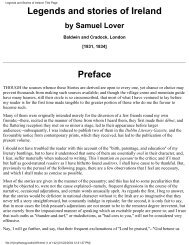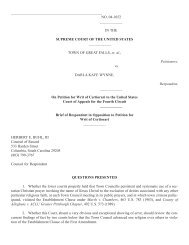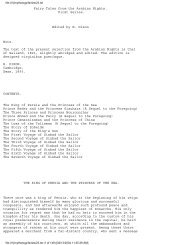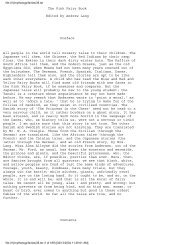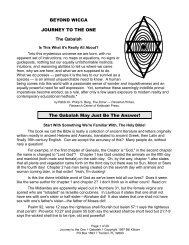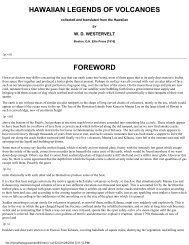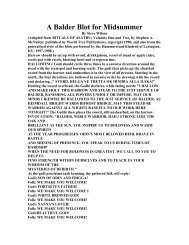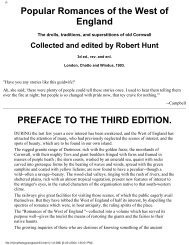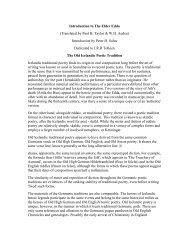Create successful ePaper yourself
Turn your PDF publications into a flip-book with our unique Google optimized e-Paper software.
It is a pity that Mr. Rees did not preserve the Welsh versions out of which he pieced together the English one; but as to Mr. Sikes, I cannot<br />
discover whence his has been derived, for he seems not to have been too anxious to leave anybody the means of testing his work, as one<br />
will find on verifying his references, when he gives any. See also the allusions to him in Hartland's Science of Fairy Tales, pp. 64, 123,<br />
137, 165, 278.<br />
Since writing the foregoing notes the following communication has reached me from a friend of my undergraduate days at Jesus College,<br />
Oxford, Mr. Llywarch Reynolds of Merthyr Tydfil. Only the first part of it concerns the legend of Llyn y Fan Fach; but as the rest is<br />
equally racy I make no apology for publishing it in full without any editing, except the insertion of the meaning of two or three of the<br />
Welsh words occurring in it:--<br />
'Tell Rhys that I have just heard a sequel to the Meddygon Myddfai story, got from a rustic on Mynydd y Banwen, between Glynnêdd and<br />
Glyntawë, on a ramble recently with David Lewis the, barrister and Sidney Hartland the folklorist. It was to the effect that after the<br />
disappearance of the forwn, "the damsel," into the lake, the disconsolate husband and his friends set to work to drain the lake in order to<br />
get at her, if possible. They made a great cutting into the bank, when suddenly a huge hairy monster of hideous aspect<br />
p. 19<br />
emerged from the water and stormed at them for disturbing him, and wound up with this threat:--<br />
Os na cha'i lonydd yn ym lle,<br />
Fi fodda dre' 'Byrhonddu!<br />
If I get no quiet in my place,<br />
I shall drown the town of Brecon!<br />
It was evidently the last braich, "arm," of a Triban Morgannwg, but this was all my informant knew of it. From the allusion to Tre'<br />
Byrhonddu, it struck me that there was here probably a tale of Llyn Safaddon, which had migrated to Llyn y Fan; because of course there<br />
would have to be a considerable change in the "levels" before Llyn y Fan and the Sawdde could put Brecon in any great jeopardy 1.<br />
'We also got another tale about a cwmshurwr, "conjurer," who once lived in Ystradgyrlais (as the rustic pronounced it). The wizard was a<br />
dyn llaw-harn, "a man with an iron hand"; and it being reported that there was a great treasure hidden in Mynydd y Drum, the wizard said<br />
he would secure it, if he could but get some plucky fellow to spend a night with him there. John Gethin was a plucky fellow (dyn<br />
"ysprydol"), and he agreed to join the dyn llaw-harn in his diablerie. The wizard traced two rings on the sward touching each other "like a<br />
number 8"; he went into one, and Gethin into the other, the wizard strictly charging him on no account to step out of the ring. The<br />
llaw-harn then proceeded to trafod 'i lyfrau, or "busy himself with his books"; and there soon appeared a monstrous bull, bellowing<br />
dreadfully; but the plucky Gethin held his ground, and the bull vanished. Next came a<br />
p. 20<br />
terrible object, a "fly-wheel of fire," which made straight for poor Gethin and made him swerve out of the ring. Thereupon the wheel<br />
assumed the form of the diawl, " devil," who began to haul Gethin away. The llaw-harn seized hold of him and tried to get him back. The<br />
devil was getting the upper hand, when the llaw-harn begged the devil to let him keep Gethin while the piece of candle he had with him<br />
lasted. The devil consented, and let go his hold of Gethin, where. upon the cwmshurwr immediately blew out the candle, and the devil was<br />
discomfited. Gethin preserved the piece of candle very carefully, stowing it away in a cool place; but still it wasted away although it was<br />
never lighted. Gethin got such a fright that he took to his bed, and as the candle wasted away he did the same, and they both came to an<br />
end simultaneously. Gethin vanished--and it was not his body that was put into the coffin, but a lump of clay which was put in to save<br />
appearances! It is said that the wizard's books are in an oaken chest at Waungyrlais farm house to this day.<br />
'We got these tales on a ramble to see "Maen y Gweddiau," on the mountain near Coelbren junction Station on the Neath and Brecon<br />
Railway (marked on the Ordnance Map), but we had to turn back owing to the fearful heat.'<br />
Before dismissing Mr. Reynolds' letter I may mention a story in point which relates to a lake on the Brecon side of the mountains. It is<br />
given at length by the Rev. Edward Davies in his Mythology and Rites of the British Druids (London, 1809), pp. 155-7. According to this<br />
legend a door in the rock was to be found open once a year--on May-day, as it is supposed--and from that door one could make one's way<br />
to the garden of the fairies, which was an island in the middle of the lake. This paradise of<br />
p. 21<br />
<strong>Title</strong> <strong>Page</strong><br />
exquisite bliss was invisible, however, to those who stood outside the lake: they could only see an indistinct mass in the centre of the<br />
water. Once on a time a visitor tried to carry away some of the flowers given him by the fairies, but he was thereby acting against their<br />
law, and not only was he punished with the loss of his senses, but the door has never since been left open. It is also related that once an<br />
adventurous person attempted to drain the water away 'in order to discover its contents, when a terrific form arose from the midst of the<br />
lake, commanding him to desist, or otherwise he would drown the country.' This form is clearly of the same species as that which,<br />
according to Mr. Reynolds' story, threatened to drown the town of Brecon. Subsequent inquiries have elicited more information, and I am<br />
more especially indebted to my friend Mr. Ivor James, who, as registrar of the University of Wales, has of late years been living at Brecon.<br />
He writes to the following effect:--'The lake you want is Llyn Cwm Llwch, and the legend is very well known locally, but there are<br />
file:///I|/mythology/celtic/26/26.html (26 of 237) [01/22/2004 12:42:26 PM]



